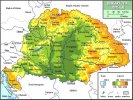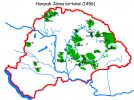Hi guys,
Long time since I've just read but not write on the blog.... Sorry!
Sorry!
I have a question related to the Medieval Hungary, especially around the Angevine dynasty.
From what I've read, the King of Hungary had a lot of power, even when they were week/contested, but I don't understand from what his power come from! To be more specific, he had the right to name, revoke, grant and take back very important tiles like Voivode of Transylvania, Bans (of Severin, Croatia, Slavonia, etc.), Hertzog (Duke) and Ispans (Counts) (especially the ones from Transylvania, like ispan of Fehevar/Alba, Hunyadi, Caras, etc. ). Even more, not only the grants were not hereditary, but some time the King revoked them at will even after a couple of years, even if the owner was very rich/powerful.
Thank you!
Long time since I've just read but not write on the blog....
I have a question related to the Medieval Hungary, especially around the Angevine dynasty.
From what I've read, the King of Hungary had a lot of power, even when they were week/contested, but I don't understand from what his power come from! To be more specific, he had the right to name, revoke, grant and take back very important tiles like Voivode of Transylvania, Bans (of Severin, Croatia, Slavonia, etc.), Hertzog (Duke) and Ispans (Counts) (especially the ones from Transylvania, like ispan of Fehevar/Alba, Hunyadi, Caras, etc. ). Even more, not only the grants were not hereditary, but some time the King revoked them at will even after a couple of years, even if the owner was very rich/powerful.
- What give him this power and why the great magnates complied?
- Any ideas on how can make them hereditary, similar to the German and French ones (starting with King Charles Robert of Anjou)?
- Any ideas on how the situation was in Poland (was ruled by King Louis the great ) ?
Thank you!

